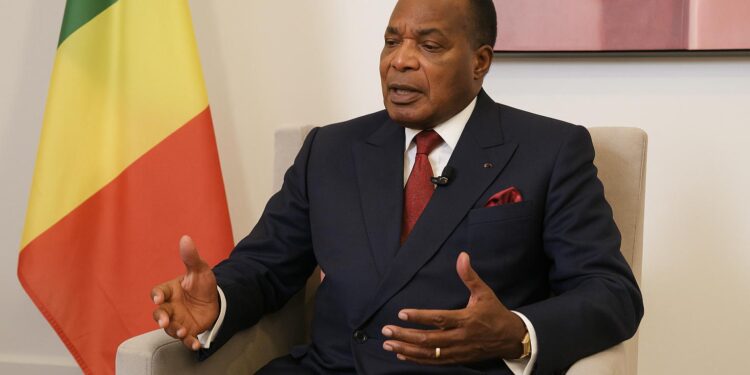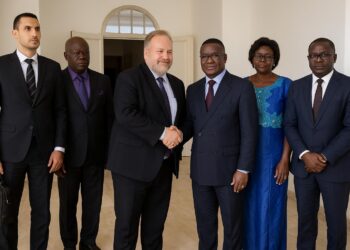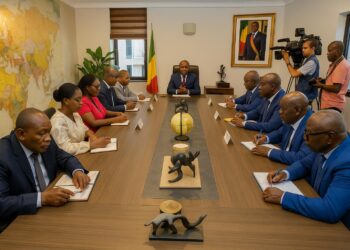A presidential pitch in New York
President Denis Sassou Nguesso used the corridors of the United Nations General Assembly to position Congo-Brazzaville as a calm, investable outpost amid uncertain global geopolitics. Speaking after U.S. President Donald Trump’s address, he welcomed Washington’s effort to tie peace deals to economic dividends (Breitbart News, 2023).
Sassou Nguesso, one of Africa’s longest-serving leaders, argued that durable growth flows from stability—an axiom that has guided his mediation work from apartheid negotiations in 1988 to Libya’s current stalemate. By echoing Trump’s peace-for-prosperity narrative, he signalled that Brazzaville seeks renewed strategic attention from the United States.
Peace diplomacy resonates with investors
The Congolese leader reminded delegates that the Brazzaville Protocol helped free Nelson Mandela and secure Namibian independence, framing the republic as a credible regional mediator. He now follows Washington’s shuttle diplomacy between Rwanda and the Democratic Republic of Congo, stressing that a settlement could unlock mineral corridors worth billions for global supply chains.
Sassou Nguesso offered to “continue the discussion” with President Trump, noting that a swift resolution in eastern DRC would reduce risk premiums for Central African projects. His message to financiers was clear: political capital invested in peacebuilding can translate into higher returns on hard infrastructure and mining assets.
Commodity endowment ready for partnership
Congo-Brazzaville’s proven oil and gas basins supply roughly 300,000 barrels per day, yet only a third of acreage is under licence according to the Ministry of Hydrocarbons. Iron ore, potash, phosphate and copper deposits line the coast and the northern hinterland, offering feedstock for steel, fertiliser and battery value chains (USGS, 2022).
“For our size, we possess significant natural resources both on the surface and underground,” the president told U.S. reporters, citing Chevron’s historic offshore footprint. He extended an invitation to American mid-caps and service providers that are currently pivoting away from higher-risk theatres.
Balancing global suitors
Beijing and Moscow remain visible in Brazzaville—China EximBank co-financed the deep-water port of Pointe-Noire, and Russia’s Lukoil recently evaluated offshore gas blocks. Yet Sassou Nguesso insisted that Congo’s ties with Washington have “not yet been fully developed,” hinting that diversification could dilute over-dependence on any single partner.
Analysts at Control Risks note that credit lines from Asia are tightening as cost-of-capital rises. By courting U.S. Export-Import Bank guarantees and International Development Finance Corporation equity, Brazzaville hopes to refinance legacy debts while accessing greener technology standards demanded by European buyers.
Congo Basin forest: a climate asset
Home to the world’s second-largest tropical rainforest, the republic is spearheading the UN Decade on Ecosystem Restoration. The 17-nation Congo Basin climate fund, backed by the World Bank, seeks USD 500 million for reforestation and carbon-market pilots aimed at corporate net-zero commitments.
Scientists estimate the basin sequesters up to 1.2 billion tonnes of CO₂ annually—more than the Amazon during drought years (Nature, 2021). Sassou Nguesso urged institutional investors to blend conservation finance with traditional extractives, arguing that “water resources, sunshine and wildlife reserves” diversify revenue while meeting ESG benchmarks.
Security hotspots and the Libyan nexus
As chair of the African Union High-Level Committee on Libya, Sassou Nguesso warned that the collapse of state authority in Tripoli fuels Sahelian insurgencies from Mali to Benin. He called Libya “the weakest link”, inviting U.S. intelligence cooperation to disrupt supply routes of arms and extremist ideology.
Linking terrorism containment to economic stability, he pointed out that pipeline corridors and trans-Sahel logistics cannot be derisked without a functional Libyan state. The argument targets American policymakers weighing counter-terror budgets against soft-power engagement.
Migration and the Mattei Plan
The president echoed Italian Premier Giorgia Meloni’s Mattei Plan, which channels concessional capital into African agribusiness and vocational training to curb irregular migration into Europe. By improving rural livelihoods, Brazzaville hopes to anchor its youthful workforce at home and expand regional consumer markets projected to reach 300 million people by 2030 (AfDB, 2023).
Sassou Nguesso believes that a coordinated EU-U.S. development push would reduce human-trafficking networks while opening export opportunities for processed timber, cocoa and light manufacturing—sectors identified in Congo’s National Development Plan 2022-2026.
Faith and soft power
With over 80 percent of Congolese identifying as Christian, the president highlighted shared religious values as an under-leveraged diplomatic bridge. He recalled American pastors filling stadiums in Brazzaville, arguing that comparable enthusiasm could translate into joint ventures in education, healthcare and renewable energy.
Cultural affinity, he suggested, lowers transaction costs and eases community consultations that often delay extractive projects. For ESG-conscious investors, social licence is increasingly priced into funding models.
Next steps: from rhetoric to term sheets
Sassou Nguesso invited President Trump to visit Congo-Brazzaville, promising a “warm welcome”. While a bilateral trip remains unconfirmed, officials in Brazzaville are drafting project pipelines for presentation at the next U.S.–Africa Business Forum. Priority projects include gas-to-power plants, fibre-optic corridors and special economic zones near the capital.
Moody’s currently rates Congo at Caa2, but Treasury officials argue that disciplined fiscal reforms and an IMF programme launched in 2022 could warrant an upgrade. An improved rating would lower borrowing costs for public-private partnerships targeting logistics and agri-processing.
Investor takeaways
For dealmakers, Congo-Brazzaville offers a rare blend of political continuity, under-explored geology and a strategic location on the Gulf of Guinea. The government’s overture to Washington underscores its intent to spread geopolitical risk and comply with higher transparency standards under the 2021 Hydrocarbons Code.
Yet challenges persist: infrastructure gaps elevate OPEX, and debt-service ratios remain above regional averages. Investors will monitor whether Brazzaville’s alignment with U.S. peace diplomacy accelerates reforms that convert resource wealth into inclusive growth. If momentum is sustained, the republic could emerge as a niche but lucrative node in the global transition economy.











































